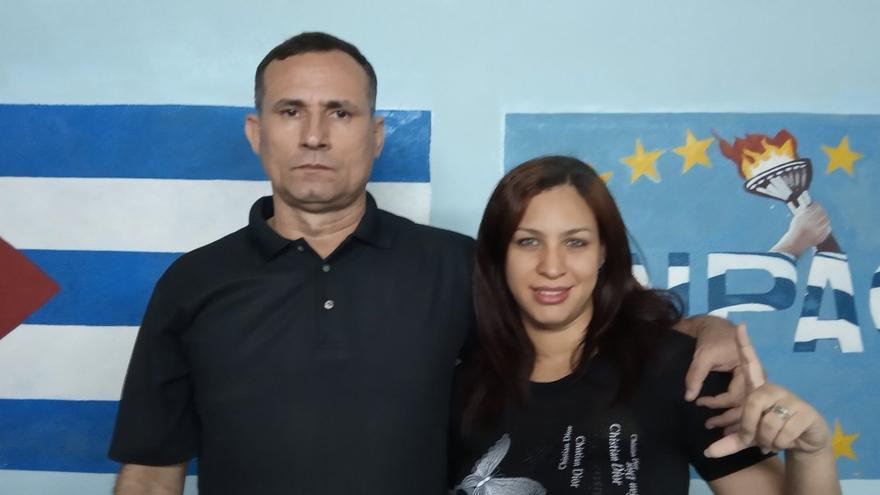
![]() 14ymedio, Havana, January 8, 2019 — Mobilization for the “No” vote in the referendum called for February 24 to approve the constitutional reform continues gaining momentum in the ranks of the opposition.
14ymedio, Havana, January 8, 2019 — Mobilization for the “No” vote in the referendum called for February 24 to approve the constitutional reform continues gaining momentum in the ranks of the opposition.
This Monday, the leader of the Patriotic Union of Cuba (Unpacu), José Daniel Ferrer, insisted that a “No” vote “is the option championed by a wide number of opposition organizations, defenders of Human Rights, and other members of Independent Civil Society both within and without domestic territory” via a message published on his personal Facebook account.
Ferrer recognizes that none of the voter’s options on the referendum — Yes, No, abstention or a null vote — is going to democratize Cuba on its own, but he believes that authorities “would prefer a broad abstention” over “a broad turnout at the polls that gives rise to a massive and conclusive No, which can be demonstrated.”

Ferrer counters those calling for boycotting the referendum via a massive abstention with the argument that in a dictatorship people don’t participate in elections and reminds his audience of five cases in which an electoral process derailed a regime, among them Augusto Pinochet’s Chile and communist Poland.
“For someone who is very knowledgeable about the Cuban — and international –reality, it’s not the most effective option [abstention],” believes Ferrer, “unless those who champion it as the only valid form have the ability to mobilize, and demonstrate that they did it, with more than 50% of Cubans with the right to vote.”
The opposition figure called on those supporting abstention to join forces and work together with those who promote voting No, although he also warned that “with those who hold paralyzed and sectarian positions, because of orders or malice, no understanding can exist” and he branded them “very good allies of tyranny.”
The Unpacu leader also calls in his message to “together defend the right of Cubans of the diaspora to participate” in the referendum and “in any question of interest for the country.”
Furthermore, the Cuban Observatory for Human Rights (OCDH) has asked the European Parliament, United Nations, and the Organization of American States (OAS) to send observers to supervise and give guarantees of the process, according to a statement published this Monday by the organization.
OCDH, headquartered in Madrid, has recommended that the three international bodies “supervise the process and prevent fraud by Havana’s regime” so that “the regime doesn’t have a free hand to change popular will,” says the letter sent to Antonio Tajana, president of the European Parliament.
The petition was also sent to members of European Parliament Antonio López Istúriz, Beatriz Becerra, María Teresa Giménez Barbat, Javier Nart, Pavel Telicka, and Dita Charanzova, among others.
The letter to European Parliament asks that the behavior of Cuban authorities be taken into account “at the time of examining whether to maintain or suspend the Agreement for Political Dialogue and Cooperation with the Island.”
In December 2016 the European Union and Cuba signed their first bilateral agreement, for political dialogue and cooperation, that put an end to the European Union’s “Common Position,” which, as of 1996, imposed on the bloc a unilateral and restrictive relationship with the Island.
Although Cuba is not part of the OAS, OCDH sent a similar missive to Luis Almagro, secretary general of the body, seeking for “the region’s nations to send delegations of impartial observers” to the Island. “The drafting and review process of the new Constitution of the Republic of Cuba has been exclusionary, conceived by and for the Communist Party of Cuba, which has written and imposed its version of the Law that will rule the destiny of the Cuban nation,” reminds the text.
In the petition directed to Michelle Bachelet, United Nations High Commissioner ofor Human Rights, OCDH underlines the importance of what will happen on February 24 when “the Cuban people are called to approve, or not, a proposal that could jeopardize their future.”
The Observatory, which along with other organizations supports the #YoVotoNo (#ImVotingNo) campaign, warns that that will be “a day of mobilization, complicated and tense.”
Translated by: Sheilagh Carey
_________________________
The 14ymedio team is committed to serious journalism that reflects the reality of deep Cuba. Thank you for joining us on this long road. We invite you to continue supporting us, but this time by becoming a member of 14ymedio. Together we can continue to transform journalism in Cuba.
